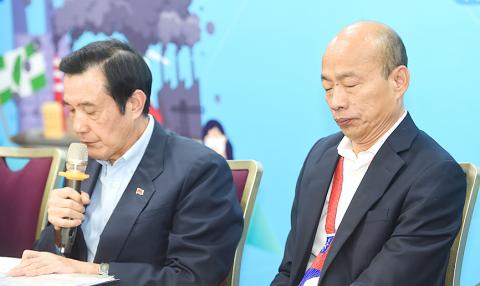Kaohsiung Mayor Han Kuo-yu (韓國瑜) yesterday said that if elected president, he would review President Tsai Ing-wen’s (蔡英文) policy to phase out the use of nuclear power by 2025, to ensure that people are free from fears of pollution and power shortages.
“If elected president, I would immediately review the erroneous policy of a ‘nuclear-free homeland by 2025’ and, based on a referendum on keeping nuclear power passed last year, propose a more reasonable and pragmatic goal and approach for the nation’s energy plan,” the Chinese Nationalist Party’s (KMT) presidential candidate told a news conference in Taipei.
He added that he “would make the fears over power shortages and having to wear a mask — which people have experienced over the past three-and-a-half years — completely disappear.”

Photo: Liu Hsin-de, Taipei Times
While most people might not understand energy policies due to their complexity, all they need is affordable electricity prices, clean air and reliable power, Han said.
To achieve those goals, Han said that he would reduce the use of coal-fired power, use more nuclear power and less renewable energy sources.
Renewable energy is more expensive and less stable, he said, adding: “We can gradually increase the use of renewable energy after the technologies mature and prices drop.”
While Tsai has denied that her policy would lead to power shortages and increased electricity prices, “that is a complete lie and utterly impossible as far as we know,” Han said.
“It is very regrettable that President Tsai would completely ignore people’s real needs at the expense of her political interests,” he said.
Asked if he would resume construction of the mothballed Fourth Nuclear Power Plant in New Taipei City’s Gongliao District (貢寮), Han said that he would to ensure its safety, of which the public would approve.
Asked about his plan to handle radioactive waste, Han said that his government would deal with it cautiously, adding that the technologies to process radioactive waste have improved significantly over the past few years.
“Taiwan is not the first nation to use nuclear power, nor does it have the most nuclear power plants,” Han said.
There are about 500 nuclear power plants worldwide, including several that are close to Taiwan, but outside the nation in Japan and China, he said, adding: “People just do not pay attention to them.”
Former president Ma Ying-jeou (馬英九) said that “we support developing renewable energy, but we are against reckless policies.”
The Tsai administration’s plan to phase out nuclear power by 2025 is not only impossible, but would drastically increase the nation’s energy costs, causing great burdens for the public, he said.
On Nov. 24 last year, Referendum No. 16, which sought to scrap the Tsai administration’s goal of abolishing nuclear power by 2025, was passed with 5,895,560 votes for and 4,014,215 against.
The proposal, initiated by Nuclear Myth Busters founder Huang Shih-hsiu (黃士修), asked: “Do you agree that subparagraph 1, Article 95 of the Electricity Act (電業法), which reads: ‘Nuclear-energy-based power-generating facilities shall wholly stop running by 2025,’ should be abolished?”

The manufacture of the remaining 28 M1A2T Abrams tanks Taiwan purchased from the US has recently been completed, and they are expected to be delivered within the next one to two months, a source said yesterday. The Ministry of National Defense is arranging cargo ships to transport the tanks to Taiwan as soon as possible, said the source, who is familiar with the matter. The estimated arrival time ranges from late this month to early next month, the source said. The 28 Abrams tanks make up the third and final batch of a total of 108 tanks, valued at about NT$40.5 billion

Travel agencies in Taiwan are working to secure alternative flights for travelers bound for New Zealand for the Lunar New Year holiday, as Air New Zealand workers are set to strike next week. The airline said that it has confirmed that the planned industrial action by its international wide-body cabin crew would go ahead on Thursday and Friday next week. While the Auckland-based carrier pledged to take reasonable measures to mitigate the impact of the workers’ strike, an Air New Zealand flight arriving at Taipei from Auckland on Thursday and another flight departing from Taipei for Auckland on Saturday would have to

A group from the Taiwanese Designers in Australia association yesterday represented Taiwan at the Midsumma Pride March in Melbourne. The march, held in the St. Kilda suburb, is the city’s largest LGBTQIA+ parade and the flagship event of the annual Midsumma Festival. It attracted more than 45,000 spectators who supported the 400 groups and 10,000 marchers that participated this year, the association said. Taiwanese Designers said they organized a team to march for Taiwan this year, joining politicians, government agencies, professionals and community organizations in showing support for LGBTQIA+ people and diverse communities. As the first country in Asia to legalize same-sex

MOTIVES QUESTIONED The PLA considers Xi’s policies toward Taiwan to be driven by personal considerations rather than military assessment, the Epoch Times reports Chinese President Xi Jinping’s (習近平) latest purge of the Chinese People’s Liberation Army (PLA) leadership might have been prompted by the military’s opposition to plans of invading Taiwan, the Epoch Times said. The Chinese military opposes waging war against Taiwan by a large consensus, putting it at odds with Xi’s vision, the Falun Gong-affiliated daily said in a report on Thursday, citing anonymous sources with insight into the PLA’s inner workings. The opposition is not the opinion of a few generals, but a widely shared view among the PLA cadre, the Epoch Times cited them as saying. “Chinese forces know full well that